1Tgjonb
1Tgjonb
1Tgjonb
Create successful ePaper yourself
Turn your PDF publications into a flip-book with our unique Google optimized e-Paper software.
conserving ecosystems, preserving cultural heritage,alleviating poverty, improving sustainablelivelihoods and adapting to the reality of climatechange. 4Sustainable tourism developmentUNWTO has prepared a range of policy and advisorypublications on sustainable tourism whicha have a direct or indirect relevance to biodiversity.These include work on tourism as a sustainabledevelopment tools, indicators, tourismand poverty alleviation, tourism in small islanddeveloping States (SIDS), coastal tourism, andmore specific tourism and biodiversity themes.UNEP has developed a series of publications ontourism development and operations in sensitiveenvironments such as coastal, deserts, mountains,rainforest. 5, 6In December 2014, the United Nations GeneralAssembly adopted resolution 69/233 on promotionof sustainable tourism, including ecotourism,for poverty eradication and environmentprotection, drawing attention to the opportunitiespresented by sustainable tourism, includingfor conservation, protection and sustainable useof biodiversity.The resolution, significantly broader in scopethan previous ones on the subject, builds on a2012 General Assembly resolution on ecotourismand draws on a report prepared by UNWTO. Inline with UNWTO recommendations, it underlinesthe importance of appropriate national policies,guidelines and regulations for promotingsustainable tourism, including ecotourism, andencourages United Nations Member States andregional and international financial institutionsto support sustainable tourism projects, enablingthe creation of small and medium-sizedenterprises, promoting cooperatives and facilitatingaccess to inclusive financial services, includingmicrocredit initiatives for the poor, localcommunities and indigenous peoples.Tourism in protected and designated areasMuch work has been done in this field, includingspecific initiatives and programmes, sustainabletourism charters, research and advisory materials.The International Union for Conservationof Nature (IUCN)’s World Commission on ProtectedAreas has established a Tourism and ProtectedAreas Specialist Group (TAPAS Group), whichfacilitates knowledge development and capacity-building.7, 8The United Nations Educational, Scientific andCultural Organization (UNESCO) has a WorldHeritage and Sustainable Tourism Programmeand has been pursuing implementation of the CBDGuidelines within its World Network of BiosphereReserves, 9 and has established a toolkit for sustainabletourism in World Heritage10, 11Sites.Tools guiding tourism concessions in protectedareas have been produced by the United NationsDevelopment Program (UNDP) for protected areamanagers 12 and by the World Bank Group forpractitioners advising them.Sustainability of tourism businessesA number of United Nations, international andsector bodies are promoting sustainability in thedesign and operation of individual tourism businesses.For example, the IUCN Business andBiodiversity Programme has produced guidelineson the sustainable use of biodiversity in hoteland resort operations. 13Sustainable tourism standards and certificationThe Global Sustainable Tourism Council (GSTC),supported by a range of international bodies, hasestablished sustainable tourism standards fortourism businesses and for destinations. Theseinclude criteria on biodiversity. The Council is alsoaccrediting certification schemes that embracethe standards. 14 For more details, see Section 6.DestiNet, an independent portal supported bythe European Commission and officially registeredas a United Nations “Partnership for SustainableDevelopment”, offers a comprehensive inventoryof worldwide certification programmes.While it may not list all initiatives, it is regularlyupdated: 15Tourism and climate changeClimate change mitigation and adaptation strategiesand actions within tourism destinations andbusinesses have important direct and indirectimplications for biodiversity. The UNWTO UNEP,OECD and other agencies have pursued various16, 17, 18studies and initiatives in this field.Sustainable Tourism and other Multilateral EnvironmentalAgreementsIn addition to UNESCO’s contribution in theframework of the World Heritage Conventionand the Man and Biosphere Programme as notedabove, a number of other biodiversity-relatedconventions are also promoting sustainabletourism. In this regard, the Convention on theConservation of Migratory Species of Wild Animals(CMS) has published a reference book,“Wildlife Watching and Tourism – a study on thebenefits and risks of a fast-growing touristic activityand its impacts on species”. 19At their COP 14, a document on boat-based wildlifewatching was distributed. 2010 Tourism Supporting Biodiversity


